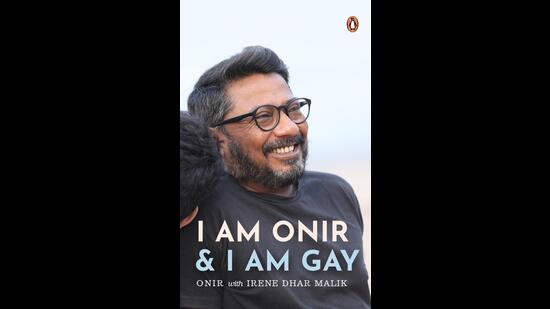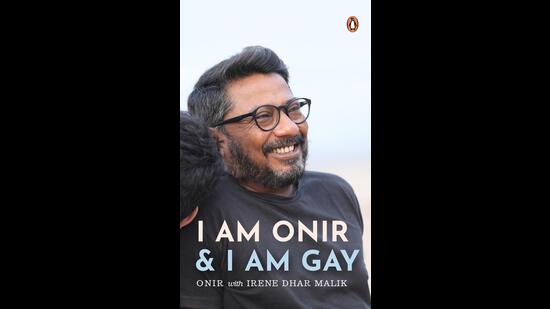Director-producer-screenwriter Onir, who is best known for making path breaking feature films with gay protagonists, especially My Brother… Nikhil (2005) and I Am (2010), speaks to us about his memoir I Am Onir, and I Am Gay. Co-authored with his sister Irene Dhar Malik, who is an editor and screenwriter, the book offers a candid account of his life as a gay man working in Bollywood, and before that.
Your sister, Irene, has been your biggest ally since you came out as gay. Even Anamika, the character played by Juhi Chawla in your debut film My Brother…Nikhil (2005), is based on your sister. How would you describe the experience of co-authoring this memoir with her?
It was a deeply emotional experience for me. I could not have imagined anyone else as my co-author. I used to write, and then send it over to my sister because my language is atrocious in terms of spelling and grammar. Even when I post something on social media, my sister calls me if I have spelt a word incorrectly. She likes correcting me. It has been like this since childhood.
When I sent her the first draft of this book, I told her, “Listen, don’t be shocked and don’t judge me.” I had to give her a bit of a warning because I had written about bits of my life that were completely unfamiliar to her. In fact, while reading, she once said, “Did I never ask you about what was happening in your life?” I replied, “Well, no, you didn’t, at some point.” I don’t hold that against her. I love her. She had her own stuff going on when she was growing up. I think that the experience of working together on this book brought us even closer than we were before.
Sometimes allies find it difficult to gauge whether asking you about certain things would come across as solidarity or intrusion of privacy. Do you think that happened in your case?
I know what you mean but that wasn’t really the case with us. She would share everything about her life with me, and she was open to hearing what I had to say. It’s just that I wasn’t so confident when I was younger. I felt that too much was happening in her own life, and so maybe it didn’t make sense to add to all that by telling her about mine. She didn’t ask, so I didn’t say. That said, my sister and I have always been close. She is just three years older than me. When I was growing up, I was closer to my brother. He is just one year younger than me. That changed after a certain point. He ventured into science. My sister and I got into filmmaking. Staying together in Bombay, it was natural that we became much more a part of each other’s lives.
What is it like to be one of the few openly gay filmmakers in Bombay’s film industry? There are other gay filmmakers but they rarely speak of their sexual orientation publicly. Could you talk about some of the joys and challenges associated with being proud and out?
There are challenges for sure but there is more joy at the end of the day. In an industry where a lot of people don’t have the courage or conviction to be out, or maybe don’t feel the necessity, I celebrate my identity. My sexuality is part of who I am, and it is not something that needs to be hidden. I feel empowered in spite of the hurdles that come my way. When rich and successful gay people tell me that coming out should be a choice and there should be no pressure to come out, I respect their stand but I also tell them, “If you’re in a position like this, you should make the effort. You don’t have much to lose. Many people would take strength from your choice.”
Let’s not start celebrating being in the closet if we want to be equals. No straight person has to live in a closet, so why should gay people have to? There is something seriously wrong with a society that promotes and rewards double standards. Being in a closet is a tragedy imposed by society, by family, by history. We don’t need to encourage it by calling it a choice.

On a slightly different note, what did you think of Karan Johar’s memoir An Unsuitable Boy (2017) co-authored with Poonam Saxena? You and Karan have the same publisher.
Hahaha! Well, I just look at myself and think that I am the suitable boy. Jokes apart, I cannot say much else because I have not read the book yet. I should comment only after I have read it.
Your films are often pitted against his in discussions about gay characters in Hindi cinema. You are seen as inclined towards advocating for justice and equality. He is seen as trying to make homosexuality palatable to straight audiences and even using it for comic relief. Is it a fair distinction to make? Wasn’t it Karan who put in a word with Aditya Chopra at Yash Raj Films, and helped you get them on board as distributors for My Brother…Nikhil?
You are right, and I will always be grateful to Karan for that. The film touched him, and he helped me. You don’t forget that sort of kindness; rather, you shouldn’t. Honestly, I feel that one can have differences in the way one looks at cinema and the way one looks at one’s identity. I will speak for myself. My life is not about making the cisgender-heteronormative world accept me. People tell me that I would have made a lot of money if My Brother…Nikhil had released today when a lot more viewers are receptive to LGBTQ stories. Perhaps I would have but I don’t think in those terms at all. The joy of being the first one to make a film like that in India cannot be compared with box office collections. It is still being shown at film festivals and in colleges.
When people say that I am trying to give a message with every film of mine, I tell them that every film gives a message directly or indirectly. Some give regressive and problematic messages through the way in which they portray relationships between men and women. They do it in the name of entertainment but it still sends across a message about what is acceptable. I like to tell stories from my heart. I try to make films that make me grow as a human being and as an artist. I make my mistakes, and I learn. Karan is great with the box office. I am not. He has the right to decide what is important for him. Similarly, I have the right to decide for myself.
We are different human beings, and as filmmakers. We have different approaches to the portrayal of LGBTQ characters. Frankly speaking, I don’t mind laughter. Comedy is beautiful but only as long as you are laughing with me and not at me. Homophobia is not funny. Neither is transphobia. We have a lot of Indian films with very problematic transgender representation. I do not want to be associated with narratives that mock and humiliate LGBTQ people. Two men holding hands is romantic just like a woman and a man holding hands. There’s no need to ruin a beautiful moment of love and milk it for laughter. Similarly, making fun of the way somebody walks or the way they move their hands is not funny at all. Well, this is my point of view.
In the book, you write about how studying comparative literature at Jadavpur University was significant for your intellectual growth. Did you read any queer literature back then?
Before I went to Jadavpur University, I had zero exposure to any queer literature or art. Actually, when I lived in Bhutan, I did not even know the word ‘gay’. There was no representation anywhere. At Jadavpur University, I got to learn about queerness in literature and art. Our professors used to talk openly about gender and sexuality while discussing Indian and Greek literature, painting, and sculpture. There was no shame attached to any of these discussions.
It was a beautiful introduction to discovering myself. The fact that my professors spoke about queerness with respect gave me confidence. It was at Jadavpur University that I watched the film My Beautiful Laundrette (1985). Hanif Kureishi, who wrote the screenplay, came to our campus.
I still remember my response to the film and the interaction with him. I said, “Oh, my God! This is my life!” Being at Jadavpur University changed my life. It made me aware of my sexuality.
When you were a student, it was not common for universities and colleges to have queer support groups. There was no social media either. How did you meet other queer people?
I didn’t know that one of my closest friends was gay. I discovered that only after graduating. Strange, isn’t it? I had experienced homosexual encounters but I never saw them through the lens of love. When you grow up in a heteronormative environment without any gay representation in popular culture, you end up thinking that love can happen only between men and women. The possibility of a fulfilling gay relationship doesn’t occur to you. All of this changed for me when I went to Germany to study cinema. I went all out to explore my sexuality, not just movies. And look at me now, making all these films with LGBTQ characters. Life has changed so much.
What is it like to be on dating apps when you’re a celebrity? Does it also put you at risk?
You’re right; it’s difficult because filmmaking is something that happens very much in the public domain. People recognize you, and they come with certain assumptions and expectations. I have deleted Grindr. I haven’t downloaded Tinder yet, though it is supposed to be better. Filmmaking is part of my identity but I don’t want to be with someone who sees me only as a filmmaker. I met someone who introduced himself as a doctor. I went out with him, and suddenly he said that he always wanted to get into films and be either a writer or an actor. It doesn’t feel good to be part of such a situation. It’s not honest. It is opportunistic. Such experiences are disheartening for me. When they happen, I end up blocking people or just disappearing as soon as I possibly can.
Being open about your sexuality has been empowering but it has also worked against you. In the book, you write about this time when you were publicly accused of sexual harassment. It was traumatic, and even led to suicidal ideation. What gave you strength?
The trust and love from my friends and family was overwhelming. That saw me through. They rebuilt my confidence, helped me pull myself together. Without them, I wouldn’t have survived.
Could you tell us about Pinecone, the film that you have just finished shooting for?
I started writing the script for Pinecone because I was really angry with the Government of India’s Ministry of Defence. They refused to give me a no-objection certificate for the script of my other film We Are because one of protagonists is a gay soldier. I wanted to direct my energy into another project; that’s how Pinecone came out. It is the story of an out and proud gay filmmaker, and it revolves around three different phases of his life intersecting with key milestones from India’s queer history. There are three love stories in this film. Each one is a celebration of queer desire, and not in a way that is asking for acceptance or approval.
A little while ago, you were in talks with Afghan American author Nemat Sadat to adapt his novel The Carpet Weaver (2019) into a film. What’s happening on that front?
We are still in talks, and I really want to make that film because the story is so powerful and the queer characters are so well etched out. A large part of it is set in Afghanistan, so it would be ideal to shoot the film there. Unfortunately, we cannot even think of shooting in Afghanistan now because of the Taliban. When the time is right, I am sure we will find a way to make it.
Perhaps you might end up going to Pakistan before Afghanistan. In your memoir, you write about this time when you and Shabana Azmi were Bilawal Bhutto’s guests in Karachi. Now that he is the Minister of Foreign Affairs in Pakistan, are you thinking of floating any ideas for collaboration between the film industries of India and Pakistan?
It doesn’t really depend on him. It depends more on the Indian government’s policy. I feel that it’s absolutely sad to stop people-to-people contact. It’s weird that Indian and Pakistani cricketers can play with each other but filmmakers and actors from the same countries aren’t allowed to work together. Even Indian and Pakistani soldiers exchange sweets with each other on festivals. Why are artists, filmmakers, musicians being discriminated against? It doesn’t make any sense.
In these times of war and violence, we should really be thinking of how to bring people together.
Chintan Girish Modi is a freelance writer, journalist and book reviewer.








